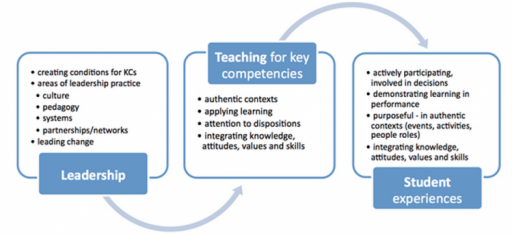Leadership and the key competencies
Learners are most likely to develop and strengthen their capabilities for living and learning when they learn with teachers in a school whose leadership creates conditions that stimulate key competencies.
The key competencies element of The New Zealand Curriculum brings with it exciting possibilities for making students’ experience of learning more relevant, engaging, meaningful, and useful. Key competencies-rich programmes will enable students to be confident, connected, actively involved learners in the present and in the future. They will encourage lifelong learners who are equipped to participate in rapidly changing local, national, and global communities.
Giving effect to key competencies in ways that address their complexity will entail significant challenge and change. Tackling those challenges and compelling change to support key competencies is a vital role for school leadership. Effective leaders create the conditions required for key competencies in teaching and learning. They need to ensure that the culture, pedagogy, systems, partnerships, and networks in their school support key competency development. Leaders also need knowledge and skills in leading change since, for many, key competencies require, and make possible, a significant change in practice.
View a text version of this diagram.
Culture
Culture: Do we value the key competencies?
Leadership of the key competencies requires a school culture that signals that those competencies are important and valued. Importance can be signaled through goals for teaching and learning, through the explicit and implicit values of the school, through traditions, and through the things that are celebrated by the school.
Goals and targets
To what extent are existing targets and goals aligned with the key competencies?
Do any existing goals relate to students thinking, relating to others, using language, symbols and texts, managing self, participating and contributing?
Are the goals well-crafted, and the conditions conducive to achieving the goals?
Values and traditions
To what extent do traditional school events support students’ development of key competencies?
What new traditions could be established that reflect key aspects of the key competencies – for instance, critical thinking, self-motivation, negotiation, contributions, interpretation?
To what extent are students actively involved in making decisions and carrying out purposeful roles in traditional school events (school trips to particular places, school social/community-building events for instance)?
Celebrations of progress and success
What do current celebrations and recognitions of success signal about what is most valued in the school community?
How might students’ capabilities in thinking, using language, symbols, and texts, managing self, relating to others, and participating and contributing, be recognised and celebrated?
How might teachers’ strengths in developing capabilities in thinking, using language, symbols and texts, managing self, relating to others, and participating and contributing, be recognised and celebrated?
Published on: 06 May 2014
Return to top


